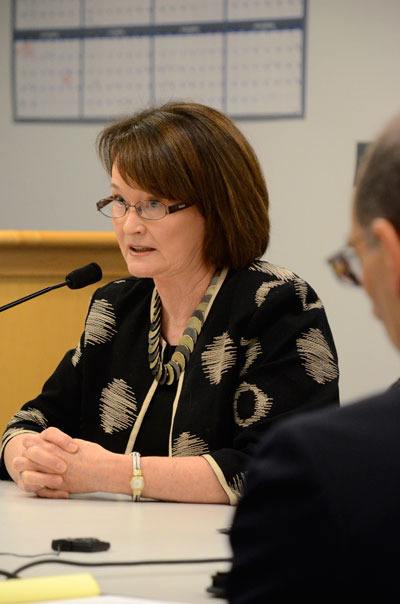Island County Recovery Services was on trial before the county commissioners Wednesday.
A contingent of Drug Court officials lobbed weighty allegations of sexual misconduct, abusive language and repeated errors, some of which nearly led to clients being sentenced to undeserved jail time.
Appearing before the board Wednesday, Drug Court leaders — Superior Court Judge Vickie Churchill, Prosecutor Greg Banks, Court Administrator Brooke Powell and others — laid out a litany of alleged mismanagement and poor performance from the treatment center.
They asked the commissioners to seek proposals from outside firms.
“At this time, we believe Island County Recovery Service is unable or unwilling to achieve an acceptable level of service and we have no other recourse but to bring this to the attention of the board of county commissioners,” said Powell, reading from a written statement.
Recovery Services, located in Oak Harbor, is a branch of county government under the umbrella of Island County Human Services.
Neither organization had a representative at Wednesday’s meeting.
Recovery Services Manager Mark MacNaughton was in the hospital and Human Services Director Jackie Henderson was attending a conference in Mount Vernon.
Because neither organization was represented, the board did not agree to the request.
Rather, the commissioners said they will discuss the issue again when both sides are present.
“I find it almost offensive that we don’t have anyone here to at least talk about the program,” Commissioner Helen Price Johnson said. “It’s extremely unfortunate that we can’t address this within the county family.”
Churchill replied that she did not “believe everyone is sick so someone could have come.”
Churchill said she rescheduled a trial to be present.
Attempts to solve the problems internally failed and that this was a last resort, Churchill said.
“We have tried to work within the county, to work within the county family and it’s not working,” Churchill said.
“As much as I am also concerned about, if you will, airing your dirty linen, nevertheless it’s become important; we’re backed to the wall and we have to do so,” she said.
“We have tried to work with Island Recovery and I think have been incredibly patient,” Banks said.
“My patience, and I think the judge’s patience, is at an end.”
Henderson, who is also a Coupeville Town councilwoman, acknowledged in a later interview with the Whidbey News-Times that “mistakes have been made.”
However, she defends her staff, describing them as a “hard-working” group of people struggling to run an out-patient treatment facility with limited financial resources.
“Mistakes have been made, I admit that, but they (Drug Court leaders) have to be realistic too with what we can do and what we can bill for,” Henderson said.
Drug Court is an alternative to traditional prosecution for non-violent drug-addicted adult and juvenile offenders. The program uses intensive treatment, supervision, rehabilitative and therapeutic approaches, and compliance with rigorous conditions to reduce recidivism and substance abuse.
The Drug Court team consists of a partnership between the Recovery Services, the prosecutor, defense counsel, probation officers and superior court judges Churchill and Alan Hancock.
According to Powell’s statement to the commissioners Wednesday, a document endorsed by the Drug Court team, more than 300 adult Drug Court studies show strong evidence of the program’s effectiveness.
The statement went on to say, however, that during the two years Recovery Services has handled treatment services, the program was rife with problems.
“Excessive” turnover in management and additional turnover with counselors resulted in “deficiencies in critical areas” and “ineffective and even counter productive” services.
“There have been a number of complaints regarding the quality of treatment, which include inappropriate sexual contact and use of abusive language toward adults and juveniles,” Powell read.
Other problems include four to six-week delays for potential Drug Court participants to receive assessments and failure to submit urinalysis samples and communicate missing urinalysis results to the Drug Court team.
The statement also alleges that “repeated erroneous information” from the treatment officials has, in some cases, nearly resulted in the “loss of liberty to Drug Court participants.”
“It was literally at the last minute that someone double checked,” Banks said in an interview after Wednesday’s meeting.
Henderson said the “inappropriate sexual contact” mentioned in the statement referred to a single instance in which a counselor and an adult patient developed a romantic relationship.
The counselor was immediately placed on paid administrative leave.
“He was gone that day, never came back,” Henderson said.
“We did everything by the book.”
Henderson said she was aware of one instance in which another counselor called a patient a name. The individual was later “disciplined,” but she defended staff again, saying they are doing a hard job working with drug addicts who don’t want to be there.
Henderson noted that complaints from patients are not solely focused on recovery services.
“I can tell you these same clients that complain about treatment also complain to us about the Drug Court,” Henderson said.
“These are folks who are master manipulators. I’m not degrading them; they are people who need help.”
“You know what they tell us is that Drug Court’s a joke,” she said. “They know what drug court wants to hear and that’s what they tell them.”
Recovery services was formed in 2011. Drug court was served by Mount Vernon-based Phoenix Recovery Services. When that agreement ended, the county sought bids from qualified firms but received no responses.
Human Services, which managed the contract, formed the treatment facility. It currently serves about 200 clients per month, with four counselors, Henderson said.
Only about 15 percent are Drug Court clients, she said.
Henderson said she didn’t want the job two years ago, but since taking on the responsibility, it’s not something she’s willing to give up unless directed by the commissioners.
“At this point, I have no intention of going out for an RFP,” Henderson said. “I stand by my staff; they are doing a good job.”



